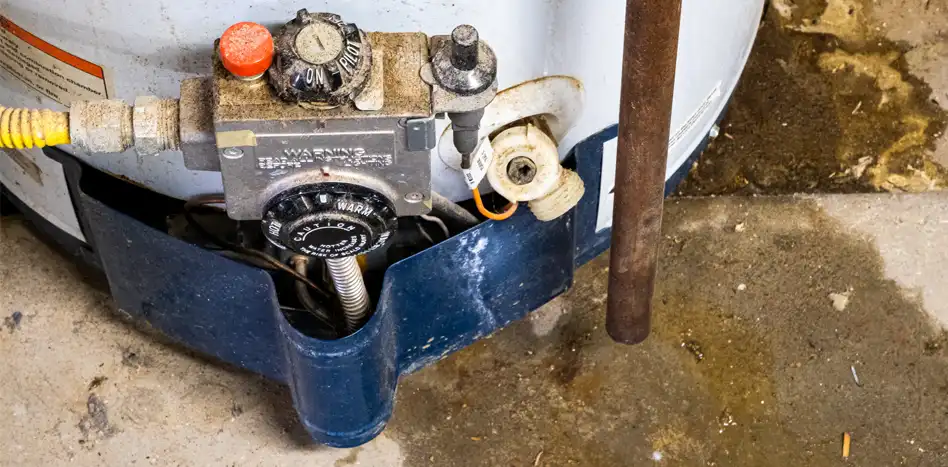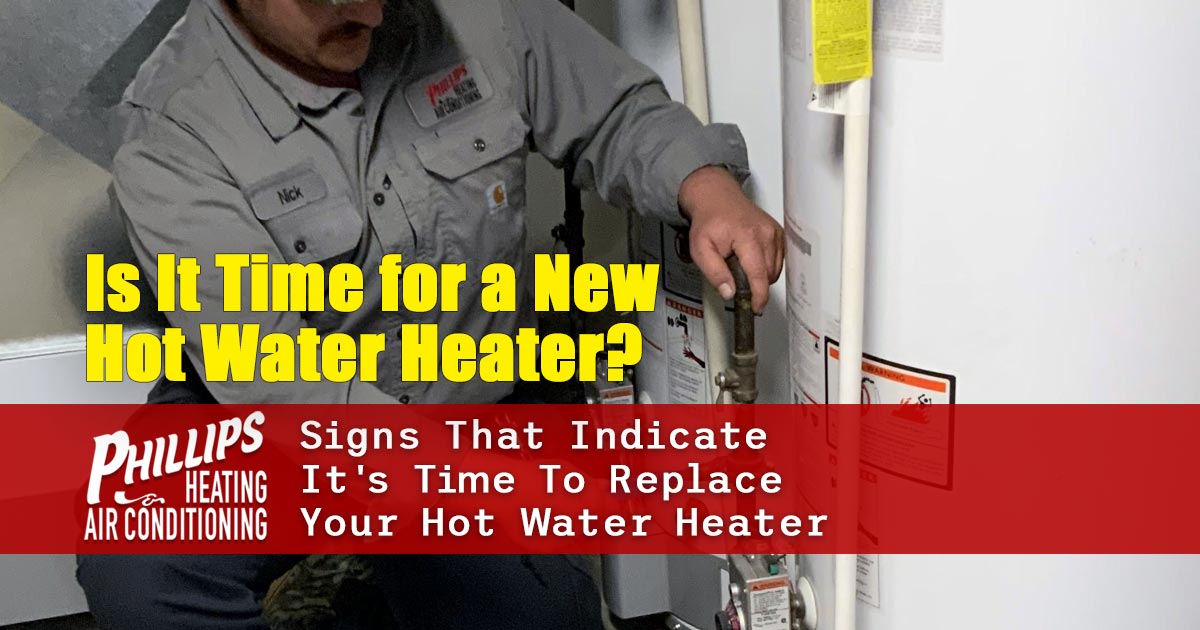Your hot water heater is an essential appliance in your home. Knowing the signs that indicate it’s time to replace your hot water heater can help you avoid unexpected breakdowns and ensure you have a reliable source of hot water in your Pittsburgh area home.
When it comes to recognizing the signs that indicate the need for a new hot water heater, age serves as a vital factor to consider. Standard water heaters typically have a lifespan of about ten years before they may start exhibiting signs of wear and inefficiency. However, it’s essential to note that water heaters exceeding 15 years old are more susceptible to malfunctions and may require replacement due to decreased efficiency and potential leaks. For example, imagine a scenario where a water heater that is over a decade old begins to show signs of rust or corrosion, indicating internal damage that compromises its functionality.
Age as an Indicator
The age of a water heater is a critical indicator of its overall condition and performance. Standard water heaters typically have an average lifespan of about a decade before they may start showing signs of wear and inefficiency, signaling the need for a replacement. However, it’s important to recognize that water heaters exceeding 15 years old are more likely to encounter issues such as leaks, rust accumulation, and reduced hot water capacity, making them candidates for replacement. For instance, a water heater that has surpassed the 15-year mark may exhibit visible signs of wear and tear, such as rusty water coming from the tap or water pooling around the base of the unit.
Advancements in water heater technology have led to more energy-efficient models, making older units less cost-effective to operate due to increased energy consumption.
Water Leakage Signs
Detecting water leakage around a hot water heater is crucial as it can indicate various underlying problems that need to be addressed promptly. For example, if you notice water pooling around the base of your water heater, it could be a sign of leaks either within the tank or in the connections. This pooling water may evolve into puddles that suggest a more serious issue like a tank leak, which, if left unattended, could result in a burst. Not only does water leakage lead to wastage, but it can also cause water-related damage, mold growth, and an increase in utility bills. Therefore, it is essential to promptly address any signs of water leakage to prevent further complications and ensure the efficient functioning of the hot water heater.
In some cases, water leakage may not be immediately visible, especially if the leak is small or located in a less accessible area. However, even a slow drip leak from a water heater, no matter how minor, should be addressed promptly to prevent damage. A small leak can gradually worsen over time, leading to significant water damage, mold growth, and potentially compromising the structural integrity of the surrounding area.
Moreover, the presence of water pooling around the water heater can also create a safety hazard, especially if the unit is located in a confined space or near electrical components. Water leaks can increase the risk of electrical shorts or malfunctions, posing a danger to occupants of the home.
Changes in Water Quality
Water quality is an extremely important topic to people here in Pittsburgh. With the three rivers and numerous small streams surrounding our community, it is important to have a steady source of clean water.
In your home, changes in water quality can serve as a clear indicator of potential problems with a hot water heater that may require attention. When rusty water is noticed coming from the tap, it is often a red flag signaling a corroded water heater tank. For instance, if you see discolored water when you turn on the hot water faucet, it is likely due to sediment buildup or rust inside the tank, indicating the need for a closer inspection or potential replacement. Furthermore, encountering a metallic taste or smell in the water could also point to corrosion within the tank, affecting the overall water quality.
Addressing poor water quality caused by a failing water heater is crucial not only for the efficiency of the system but also for the health and safety of individuals using the water. Water heaters that are not functioning correctly can introduce harmful elements into the water supply, compromising its quality. In some cases, poor water quality can lead to health risks such as skin irritation, gastrointestinal issues, or respiratory problems. Therefore, it is essential to take immediate action when noticing any changes in the water quality to prevent any health risks associated with contaminated water. Regular maintenance and timely replacement of a deteriorating water heater can help maintain a safe and hygienic water supply for your household.
Water Temperature Inconsistencies
Water temperature inconsistencies can often serve as a clear indicator that your water heater may be on the decline and in need of attention. For example, if you notice that the water temperature fluctuates between hot and cold or if you are only getting lukewarm water instead of the usual hot water, this could suggest that your water heater is struggling. Imagine stepping into a shower expecting a warm and relaxing experience, only to be greeted by a sudden blast of cold water due to an unpredictable water heater. These fluctuations can not only be inconvenient but also uncomfortable, disrupting your daily routine.
Moreover, these variations in water temperature can significantly impact your household chores. For example, when washing dishes, you might find that the water temperature is not consistent enough to effectively clean greasy dishes, leading to subpar results. Similarly, if you rely on hot water for laundry, inconsistent temperatures can affect the washing process and the cleanliness of your clothes.

Energy Efficiency Issues
Energy efficiency problems can be a clear indication that your water heater is reaching the end of its operational lifespan. Noticing a sudden increase in your energy bills, especially without any apparent changes in usage, could be a sign that your aging water heater is working harder and consuming more energy. For example, if your monthly utility costs have significantly risen over the past few billing cycles despite consistent hot water usage, this could point towards the inefficiency of your current water heater. Identifying and addressing energy efficiency issues promptly can help homeowners save on energy costs and reduce their environmental impact.
Investing in an energy-efficient water heater can not only lower your utility bills but also contribute to reducing your overall carbon footprint. By upgrading to a more energy-efficient model, you can enjoy cost savings in the long run while also being environmentally conscious.
Auditory Signs of Hot Water Heater Malfunction
Unusual sounds coming from a water heater are often a clear indicator of underlying problems that may require immediate attention. For example, if you hear a loud banging or rumbling noise, it could be a sign of sediment buildup within the tank, which can reduce the heater’s efficiency over time. This sediment accumulation not only affects the performance of the water heater but can also lead to increased energy consumption and higher utility bills. Therefore, it is crucial not to overlook these auditory signs as they can escalate into more serious issues if left unaddressed.
Visual Indicators
When assessing the state of a water heater, it’s essential to pay attention to visual indicators that can reveal underlying issues and potential malfunctions. For instance, frequent repairs on a water heater that is only halfway through its expected lifespan may signal significant wear and tear, hinting at the need for a new unit. An illustrative example of this could be a water heater that has required multiple thermostat replacements within a short period, indicating a systemic problem that might be more cost-effective to address by replacing the entire unit. By recognizing visual indicators of wear and damage, homeowners can take proactive steps to address potential issues before they escalate into costly repairs or system failures.
Pittsburgh Hot Water Heater Replacement
When it comes to replacing your hot water heater in your Pittsburgh area home, Phillips Heating & Air Conditioning Plumbing Services stands out as the best plumbing company for Pittsburgh How Water Heater Replacement. With years of experience serving the Pittsburgh community, we have built a reputation for excellence and reliability. Our Master Plumber is highly trained and equipped to manage any hot water heater replacement or repair with precision and efficiency.
What sets Phillips Heating & Air Conditioning Plumbing Services apart is our commitment to customer satisfaction. We understand that a hot water heater replacement is often a sudden significant investment for homeowners, and we strive to make the process as smooth and stress-free as possible.
When you choose Phillips Heating & Air Conditioning Plumbing Services for your hot water heater replacement, you can rest assured that you are getting the best service in the Pittsburgh area.
Need more information?
Call us at 412-431-6563 or contact us here ›







